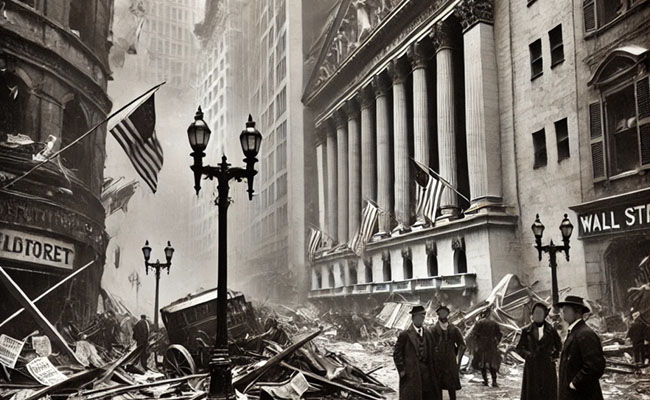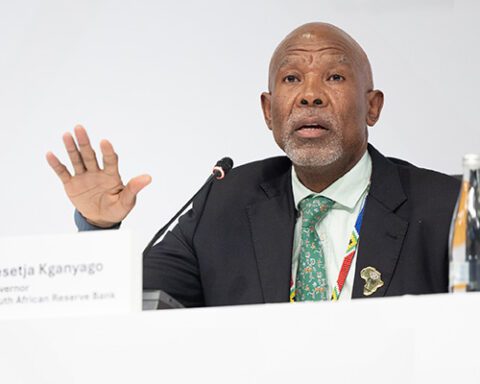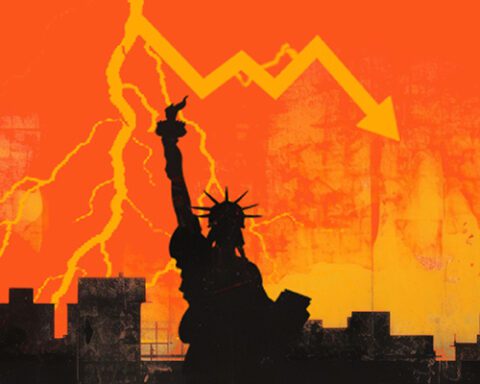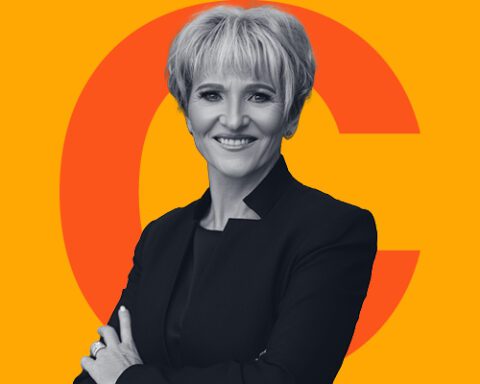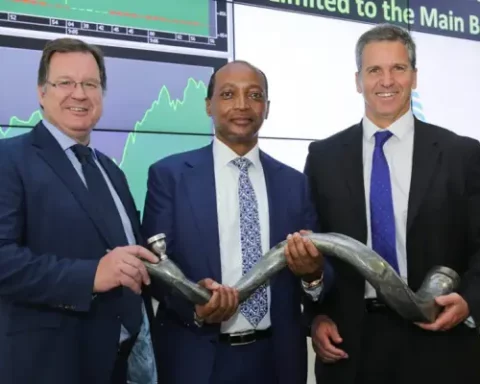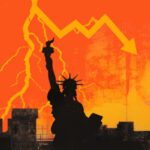Donald Trump is “just getting started”. This may be a rhetorical shot in the arm for the Maga-fan base, but it’s behaved like an arrow in the buttocks of US markets, which have endured a thrashing in the past couple of weeks, largely thanks to chaotic flip-flopping over Trump’s tariff policies.
This year, the S&P 500 is down 1.7% – an abrupt reversal from the record it hit just three weeks ago. The Euro Stoxx 50 on the other hand is up 11%, and the Hang Seng has gained 23%. Is this a signal to investors that they need to pull their money from the world’s largest economy?
In a note to clients this week, Sasfin’s head of global equities and perma-bull David Shapiro wrote that Trump’s tariffs have hurt the US economy in a big way.
“Trump’s economic and political strategies appear disjointed, lacking a clear and consistent vision. He has no grand economic vision or even political logic behind them. Trade is a game of weighing the costs versus the benefits. Tariffs could turn out to be nothing but cost,” he said.
The consequences of Trumpian unpredictability “include delays in investment, inventory disruptions, and rising inflationary expectations. A weakening of regulatory controls could lead to serious financial instability. The global community is also beginning to question America’s reliability as a trading partner, as Trump’s tariff policy risks isolating the US from crucial economic alliances.”
Shapiro isn’t alone in thinking this.
“Investors are starting to think the US administration is losing control of the narrative,” Luca Paolini, chief strategist at Pictet Asset Management told the Financial Times. Already, consumer confidence in the US has retreated sharply and manufacturing orders are falling.
It sounds horrible, but the question is: how should investors respond? Currency canvassed a range of local money managers with high exposure to US markets on this point. And their message was: don’t lose your cool.
“We’ve had two years of 20%-plus returns which got us to the highest valuation in 20 years; that’s the starting point and people often forget the extent to which the market had rallied, so any lack of confidence or increased uncertainty will always get punished,” says Anchor Capital CEO Peter Armitage.
Benguela Global Fund Managers’ chief investment officer Zwelakhe Mnguni is bracing for “a lot of volatility”, but urges investors not to get too disheartened, given how solid company earnings have been.
This strength of underlying profits is a critical point to remember, says Vestact CEO Paul Theron.
“My rule of thumb is that markets always follow earnings and those have been strong – everything is where it needs to be and deserves to be,” he argues. “To try and form an opinion based on vibes and anxieties and Musk and Doge [the US department of government efficiency] is almost certainly a bad idea. It doesn’t work that way anyway.”
Is AI dot.com 2.0?
But what if, as Brooke Masters argued in the FT, we are witnessing the bubble popping on the extraordinary rally of the past two years, fuelled by faith in a future shaped by AI?
Chipmaker Nvidia, which is emblematic of this frenzy, has lost a quarter of its value since January, even as its earnings remain the stuff most companies can only dream of.
Mnguni says the selloff in Nvidia is a classic case of “when very good is still not good enough”. “Growth expectations may have been unsustainably high but if I were already in Nvidia, I’d try and ride it out because I cannot see any reason for why [the stock] would be lower in five years’ time,” he tells Currency.
Nvidia peaked at $149 per share on January 6, but is now $112. Mnguni said it could still fall far further, below $100, “but that may be an opportunity for those who want to invest to climb in – and I think you’d probably still do better with those stocks than with many other geographies”.
AI, as it turns out, is central to understanding the market right now, given that its arrival probably rivals the dawn of the cellphone and the internet in terms of disruption and potential – a moment that “got certain shares into a frenzy”, says Armitage.
The key question is whether the growth prospects for AI companies such as Nvidia have actually changed, and whether the billions being spent on AI and data centres will translate into higher profits for other firms.
In this uncertainty, investors have swapped money back into cash. More than $51bn was diverted into money market funds last week, according to the FT, which has pushed the total to a record $7.03-trillion as of Wednesday, according to the trader group, Investment Company Institute.
Armitage says Anchor is “the most bullish on cash that we’ve ever been” at this particular point. “On a risk-adjusted basis you can earn 4.25% in cash,” he says. In other words, you can beat inflation without taking any risk, whereas you have to be “fairly certain of getting 7% to 8% in equities to justify the extra risk”.
But that’s not a view shared by Theron. Vestact’s daily missives to his clients ram home the message that the noise of a thousand excitable pundits is best avoided if you’re in it for the long term. When it comes to stocks, he says, “blithe optimism is a better strategy than almost anything else”.
It’s quite something to have writers in your own publication quoted back at you, but as Theron tells Currency: “We’ve got clients phoning us now [to say] the world is fucked, but I love that comment from Tim Cohen: ‘It’s not doomsday, it’s just Friday.’”
Having said that, Theron reveals that the Vestact team – which usually orders a collective lunch in on Friday – is buying Steers this week, and not steaks from Rosebank’s Grillhouse.
America or bust
The question is wider than AI, however: is the entire “US exceptionalism trade” over, or is the air simply being let out of its inflated tyres? This strategy, which saw billions of dollars sluiced into the “Magnificent 7” – Apple, Google owner Alphabet, Microsoft, Amazon, Meta Platforms (which owns Facebook), Elon Musk’s Tesla, and Nvidia – paid off extravagantly until Trump. This year, however, those stocks, as a whole, have lost 10.2%.
Analysts are divided over whether rotating out of the US and into Europe is the right call. Some countries have done well – German stocks have had an amazing two weeks based on the about-turn in the country’s defence spending pledges and decision to open the spending taps – but others, like the US, less so.
Mnguni warns that, as a result of Trump’s tariffs, “there is a risk that China with all its manufacturing capacity will dump their products in other markets like Europe, so Europe might come under enormous pressure”.
If that happens, this will have an acute impact on Europe’s industrial export powerhouses.
This is a view shared by Armitage. “European shares were trading at average values and US shares at their highest valuation so it’s not a surprise to see the rotation, but there’s no reason to be more bullish about the European economy,” he says.
Amid all of this, there is still the spectre of the trajectory of interest rates, which is fundamental to how equities are priced, as it affects their cost of capital.
While interest rates were supposed to come down this year, based on the expectation of falling global inflation, Trump’s tariffs – which would normally lead to higher prices – have cast doubt on this projection.
On Friday, US Federal Reserve chair Jay Powell did his best to soothe frazzled nerves, telling reporters that the US economy remains “in good shape”. Powell says the Fed is in “no hurry” to cut interest rates, but is “well positioned to wait for greater clarity”.
Mnguni says markets may tread water until there is clarity on Trump’s geopolitical play. “I’m seeing inflation rising a little bit as a result of tariffs, rates being held flat and then consumer spending falling, but that would mean that rates would have to be used to try and soften the blow on the consumer,” he says.
Shapiro says nothing has changed, other than the fact that markets are becoming extremely nervous about Trump’s flip-flopping. “As [Bill] Clinton’s former treasury secretary Robert Rubin said during a Bloomberg economic conference this week, the Trump administration hasn’t the foggiest idea what they are doing,” he says.
Nonetheless, he remains a fervent believer in the “unmatched” resilience of American businesses. “From Silicon Valley’s innovation to Wall Street’s adaptability, the US economy has historically weathered far worse challenges,” he says.
For Theron, what is needed now is an ability to look above the noise.
“Remember if you own shares in exciting companies, this is part of the deal – what you’ve really got to ask yourself is: are they going to continue to grow and increase sales? And if you own Nvidia, I’d say yes. [A selloff] is not nice, but it’s just the way it is,” he says.
Sign up to Currency’s weekly newsletters to receive your own bulletin of weekday news and weekend treats. Register here.
